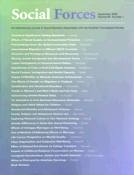-
Views
-
Cite
Cite
Zhenchao Qian, Daniel T. Lichter, Leanna M. Mellott, Out-of-Wedlock Childbearing, Marital Prospects and Mate Selection, Social Forces, Volume 84, Issue 1, September 2005, Pages 473–491, https://doi.org/10.1353/sof.2005.0117
Close - Share Icon Share
Abstract
We apply marital search theory to examine whether out-of-wedlock childbearing affects mate selection patterns among American women. Using 1980–1995 CPS data, we apply probit models with selection to account for potential selection bias due to differences in “marriageability” between women in and not in unions. Compared to those without unmarried births, women with unmarried births are more likely to cohabit than to marry, and they are more likely to have less-educated and older spouses or partners. White women with unmarried births are also more likely than those without to have husbands or partners of another race. Thus, women with unmarried births tend to cohabit and are less “well matched.” These results have important implications for public policy that increasingly regards marriage as a panacea for low-income women.



